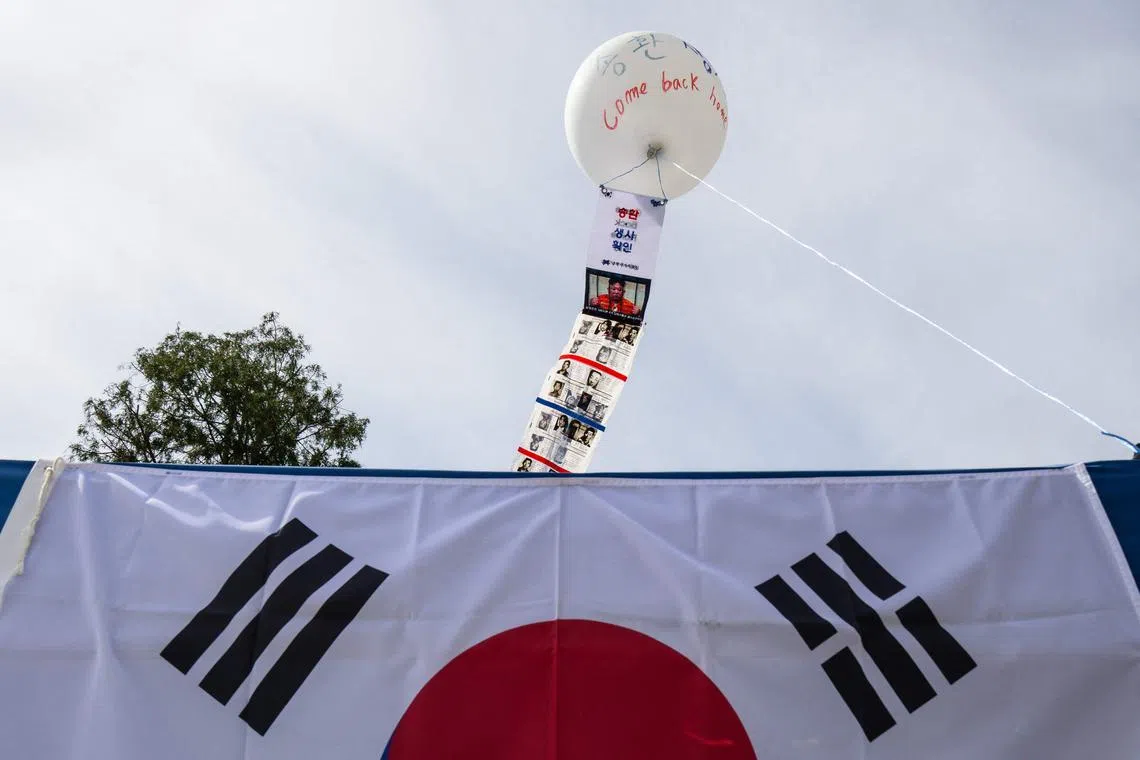South Korea’s balloon crackdown hits anti-North Korea activists
Sign up now: Get insights on Asia's fast-moving developments

South Korean President Lee Jae Myung said that activists should be “severely punished” if they continue the balloon operations that anger North Korea.
PHOTO: AFP
Follow topic:
POCHEON – The equipment activist Lee Min-bok uses to send balloons laden with anti-Kim Jong Un leaflets across the border from South Korea into the North has been gathering dust and cobwebs for months.
When it became clear that centre-left politician Lee Jae Myung was on track to win the June 2025 presidential election, Mr Lee Min-bok was among several South Korea-based activists who stopped their missions, anticipating a crackdown by the new, pro-engagement administration.
Mr Lee Jae Myung, a former human rights lawyer, is pushing to ease tensions with Pyongyang and said in June that activists should be “severely punished” if they continue the balloon operations that anger North Korea.
“I’ve been doing it quietly and what’s wrong with that? Provoking North Korea? No way,” 67-year-old Mr Lee Min-bok told Reuters as he stood next to a rusting truck equipped with a hydrogen tank for filling balloons.
“But realistically, look how serious it is right now. Police are out there and if I move, everything will be reported.”
For years, the police have monitored Mr Lee Min-bok from the home next door – one plainclothes officer told Reuters they are there to protect him from potential North Korean threats – but instead of checking weather reports for ideal balloon launching conditions, Mr Lee Min-bok now spends his days writing online posts criticising the South Korean government.
Calls to activists
The activists, many of whom are North Korean defectors like Mr Lee Min-bok, are used to being at the centre of geopolitical tensions.
An attempt by a previous liberal South Korean president to ban the balloon launches was struck down as unconstitutional. In 2024, North Korea began launching waves of its own balloons into the South, some carrying garbage and excrement.
Mr Lee Jae Myung, who took office on June 4, has promised to improve relations with the nuclear-armed North, saying tensions with Pyongyang have had a real negative economic impact. He has urged diplomacy and dialogue, and his administration has also suspended anti-North Korea loudspeaker broadcasts along the border.
North Korean leader Kim Jong Un, however, abandoned a goal of unification with the South in 2024 and has shown little openness to diplomacy.
After Mr Lee Jae Myung ordered measures to stop leaflet launches, officials and the police discussed plans including deploying the police to border regions to pre-empt launches, and punishing the activists by using regulations such as aviation safety laws, according to the Unification Ministry that handles inter-Korea affairs.
Several groups in the South regularly send balloons to the North carrying leaflets, Bibles, food, money, and various media.
In 2024, the police had investigated about 72 cases of anti-North leaflet activities and sent 13 to prosecutors, another police official said. They are still looking into 23 cases, the official added.
The police are also investigating six Americans who attempted to deliver around 1,300 plastic bottles filled with rice, dollar notes and Bibles to North Korea.
“Fear is spreading. The mood is (expletive) intense,” said another North Korean defector-turned-activist who had secretly flown balloons once or twice a month for more than a decade.
The activist said he had paused the launches this spring when polls showed Mr Lee Jae Myung was likely to win the election.
“I get calls from the government recently that apparently want to check in, to see whether I am going to send the balloons or not,” said the Seoul-based activist, who declined to be named for fear of reprisals.
Mr Choi Sung-yong, leader of the Abductees’ Family Union who works to bring home South Koreans abducted by North Korea, said his group had decided to suspend the balloon launches after receiving calls from new government officials.
Mr Chung Dong-young, the Unification Minister nominee, said he rang Mr Choi in June and thanked him for reconsidering the balloon launches which Mr Chung described "a catalyst to confrontation and hostilities" between the two Koreas.
‘Right Balance’
North Korean officials have labelled leaflet activists in South Korea “human scum” and in 2020, demolished an inter-Korean liaison office during a spat over leaflets. In 2022, they claimed the balloons could carry the coronavirus.
The Lee administration’s moves have been welcomed by some residents who have said the launches put them at risk.
“I feel much more comfortable and hopeful… People couldn’t sleep,” said Mr Park Hae-yeon, 65, a farmer in Paju whose family runs a restaurant near the border. “Now I am hearing leaflets not being distributed, I see a sign of hope.”
Mr James Heenan, who represents the UN High Commissioner for Human Rights in Seoul, told Reuters that leaflet operations are a matter of free expression that need to be balanced with legitimate national security concerns.
“We hope the right balance will be struck,” he said, noting that previous punishments were overly harsh. REUTERS

